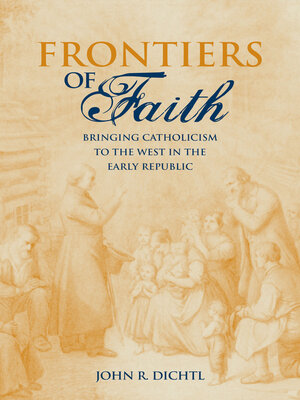
Sign up to save your library
With an OverDrive account, you can save your favorite libraries for at-a-glance information about availability. Find out more about OverDrive accounts.
Find this title in Libby, the library reading app by OverDrive.



Search for a digital library with this title
Title found at these libraries:
| Library Name | Distance |
|---|---|
| Loading... |
"[A] vital history . . . it adds immensely to our understanding of the place of religion, especially Catholicism, in the nineteenth-century United States." —American Historical Review
Frontiers of Faith: Bringing Catholicism to the West in the Early Republic examines how Catholics in the early nineteenth-century Ohio Valley expanded their church and strengthened their connections to Rome alongside the rapid development of the Protestant Second Great Awakening. In competition with clergy of evangelical Protestant denominations, priests and bishops aggressively established congregations, constructed church buildings, ministered to the faithful, and sought converts. Catholic clergy also displayed the distinctive features of Catholicism that would inspire Catholics and, hopefully, impress others. The clerics' optimism grew from the opportunities presented by the western frontier and the presence of non-Catholic neighbors. The fruit of these efforts was a European church translated to the American West.
Using extensive correspondence, reports, diaries, court documents, apologetical works, and other records of the Catholic clergy, John R. Dichtl shows how Catholic leadership successfully pursued strategies of growth in frontier regions while continually weighing major decisions against what it perceived to be Protestant opinion. Frontiers of Faith helps restore Catholicism to the story of religious development in the early republic and emphasizes the importance of clerical and lay efforts to make sacred the landscape of the New West.
"Dichtl's work is thoroughly researched and meticulously documented, but he employs enough anecdotes of fiery priests, recalcitrant laymen, and saintly (and not-so-saintly) bishops to give his narrative a lively pace." —Ohio Valley History
"Dichtl has produced one of the finest studies of Catholicism in the early republic." —Journal of the Early Republic
Frontiers of Faith: Bringing Catholicism to the West in the Early Republic examines how Catholics in the early nineteenth-century Ohio Valley expanded their church and strengthened their connections to Rome alongside the rapid development of the Protestant Second Great Awakening. In competition with clergy of evangelical Protestant denominations, priests and bishops aggressively established congregations, constructed church buildings, ministered to the faithful, and sought converts. Catholic clergy also displayed the distinctive features of Catholicism that would inspire Catholics and, hopefully, impress others. The clerics' optimism grew from the opportunities presented by the western frontier and the presence of non-Catholic neighbors. The fruit of these efforts was a European church translated to the American West.
Using extensive correspondence, reports, diaries, court documents, apologetical works, and other records of the Catholic clergy, John R. Dichtl shows how Catholic leadership successfully pursued strategies of growth in frontier regions while continually weighing major decisions against what it perceived to be Protestant opinion. Frontiers of Faith helps restore Catholicism to the story of religious development in the early republic and emphasizes the importance of clerical and lay efforts to make sacred the landscape of the New West.
"Dichtl's work is thoroughly researched and meticulously documented, but he employs enough anecdotes of fiery priests, recalcitrant laymen, and saintly (and not-so-saintly) bishops to give his narrative a lively pace." —Ohio Valley History
"Dichtl has produced one of the finest studies of Catholicism in the early republic." —Journal of the Early Republic






